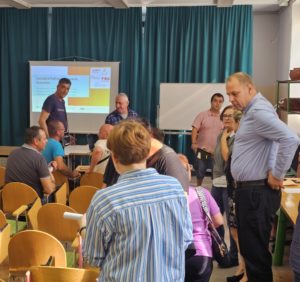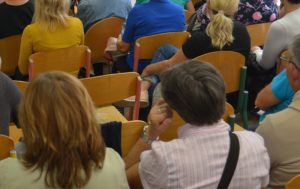Community Engagement Event in Slovenia
15th March 2024
Slovenia
The event started with an overview of what the project is about: its goals, the people involved, and what has been achieved.
The event discussed how different countries help people with disabilities find jobs and the similarities and differences between them.
The event had 20 participants from both public and private sectors, and they discussed how to improve policies and practices for helping people with disabilities find jobs.
Independent Living:
- Independent living was explained as very important for planning, job counseling, and support services for people with disabilities.
- It’s about more than just getting jobs; it also affects future education and labor policies.
Policy and Focus Group Results:
Documents and group discussions were shared about:
- How services work together
- Vocational training
- Helping people become independent
- Individualized plans
- Tools to assess needs
Slovenian Case Study:
A story from Slovenia was shared to show how counseling and job training work in that country.
Curriculum Feedback:
The event ended with a talk about the Include3 method curriculum, where people shared ideas on making it easier for people with disabilities to find jobs and improve rehabilitation services.
Participants highlighted the importance of better networks to provide individualized help.
Key Takeaways:
Since 2018, there have been important changes in mental health services that also affect people with disabilities.
Getting a job is important for living independently and should involve everyone, including employers and services.
Rehabilitation plays a key role in connecting people with disabilities to employers, and workplaces need to adapt to meet different needs.
Some challenges remain, especially in making jobs more flexible for people with disabilities.
Employment centers are helping by adjusting jobs to fit different abilities.
The multiplier event highlighted recent developments in a project, emphasizing the evolution of project materials over the past year. The event commenced with an overview of project details: objectives, partners, target groups, and projected versus achieved results. This introduction was followed by an examination of employment landscapes and labour market integration across partner countries, identifying key similarities and disparities to optimize effective strategies and address challenges.
The significance of independent living was underscored as foundational for inclusive planning, counseling, career guidance, and support services for individuals with disabilities. This concept extends beyond labor market inclusion, shaping future education and labor policies involving diverse public and private stakeholders.
Policy documents >> and focus group outcomes were presented next, elucidating insights gleaned, such as the balance between service dispersion and cooperation, vocational training, independence, individualized planning, assessment tools, interdisciplinarity, and connectivity.
A case study from Slovenia was shared, offering a tangible scenario to enhance understanding of labor market orientation, counseling, and training within national contexts.
The event culminated in a debate on the inaugural outline of the Include3 method curriculum, with participant feedback clustered around themes of employment access and rehabilitation service enhancement. Notably, the dialogue underscored the need for strengthened networks in rehabilitation services to accommodate individualized approaches.
Feedback also emphasized systemic shifts, especially since 2018, aligning with the National Mental Health Program Resolution.
Employment emerged as a critical facet of independent living, advocating for inclusivity in decision-making processes across services.
Rehabilitation was highlighted as pivotal in bridging employers and potential employees, necessitating workplace adaptations to meet diverse needs.
Remaining challenges center on adapting job structures to accommodate individuals with disabilities, particularly in flexible employment opportunities. Employment centers were noted for their adaptability in customizing work procedures to individual abilities, facilitating employment for those facing limitations.
Overall, the event brought together 20 external participants from diverse public and private sectors, facilitating comprehensive discussions on advancing inclusive labor market policies and practices.



